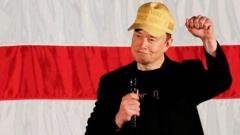Tech mogul Elon Musk has ignited controversy with his announcement to distribute $1 million daily to registered voters in crucial swing states leading up to the U.S. presidential election on November 5. The billionaire's campaign, AmericaPAC—a group formed to bolster Republican nominee Donald Trump—will select a winner from those who sign a petition advocating for the U.S. Constitution. The first checks were awarded during a recent town hall meeting in Pennsylvania, with Musk's initiative aiming to generate excitement and voter participation.
The strategy, however, has faced backlash. Pennsylvania Governor Josh Shapiro, a Democrat supporting Kamala Harris, expressed his discontent, stating on NBC's Meet the Press that the financial offers are "deeply concerning," and may warrant law enforcement scrutiny. Election law expert Rick Hasen emphasized that Musk's approach could be classified as illegal under federal statutes that prohibit payments for voter registration or voting. Although participants are asked to sign a form, Hasen contended that the underlying motives of attracting voters might breach legal boundaries.
The competition targets individuals in Pennsylvania, Georgia, Nevada, Arizona, Michigan, Wisconsin, and North Carolina—key battlegrounds that significantly influence election outcomes. Notably, eligible participants must only be registered voters in these states, raising further legal red flags. Those who engage with the petition can earn $100 for signing and an additional $100 for each successful referral, while voters in other battleground states can earn $47 for each referral.
Musk has been vocal about his goals for AmericaPAC, stating an aspiration to gather between one to two million signatures supporting provisions for free speech and gun rights. He suggested that this surge in grassroots support sends a vital message to elected officials. As a prominent supporter of Trump, Musk has already contributed $75 million to AmericaPAC, a group emerging as a pivotal force in Trump's electoral campaign.
The dynamics of this giveaway challenge the fundamental principles of electoral integrity in the U.S. While no direct payments are made for votes, the introduction of money into the voting process can lead to complications surrounding fairness and transparency. As Musk continues to exert influence in the political sphere, the ramifications of his unprecedented initiative will likely resonate throughout the electoral landscape and beyond.

















